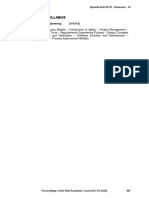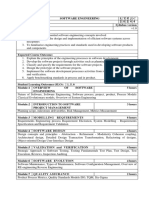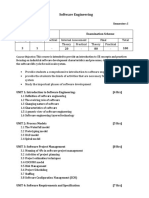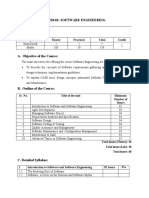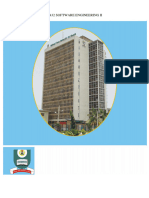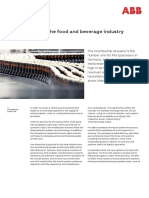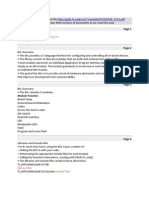0% found this document useful (0 votes)
22 views2 pagesSyllabus
This document outlines the course details for the Software Engineering course UCSC102L. The course is for 3 credits and consists of 45 total lecture hours. The course objectives are to understand fundamental software engineering concepts like process, product, and project development. The course outcomes are for students to demonstrate basics of software engineering process and development, illustrate various process models and activities, analyze software requirement engineering and system models, and inspect computer systems to meet customer needs. The course is divided into 8 modules that cover topics such as introduction to software engineering, requirements engineering, architectural design, validation and evolution, software project management, quality management, configuration management, and contemporary issues. Students will be evaluated through tests, assignments, quizzes, and seminars
Uploaded by
daechliltae23Copyright
© © All Rights Reserved
We take content rights seriously. If you suspect this is your content, claim it here.
Available Formats
Download as PDF, TXT or read online on Scribd
0% found this document useful (0 votes)
22 views2 pagesSyllabus
This document outlines the course details for the Software Engineering course UCSC102L. The course is for 3 credits and consists of 45 total lecture hours. The course objectives are to understand fundamental software engineering concepts like process, product, and project development. The course outcomes are for students to demonstrate basics of software engineering process and development, illustrate various process models and activities, analyze software requirement engineering and system models, and inspect computer systems to meet customer needs. The course is divided into 8 modules that cover topics such as introduction to software engineering, requirements engineering, architectural design, validation and evolution, software project management, quality management, configuration management, and contemporary issues. Students will be evaluated through tests, assignments, quizzes, and seminars
Uploaded by
daechliltae23Copyright
© © All Rights Reserved
We take content rights seriously. If you suspect this is your content, claim it here.
Available Formats
Download as PDF, TXT or read online on Scribd
/ 2



